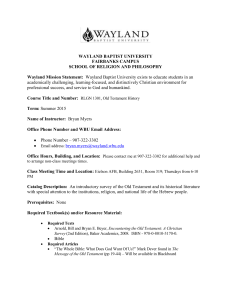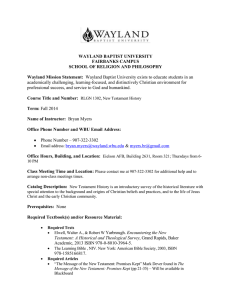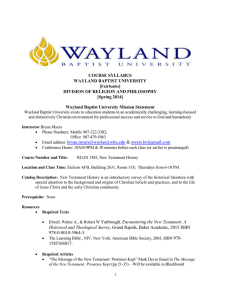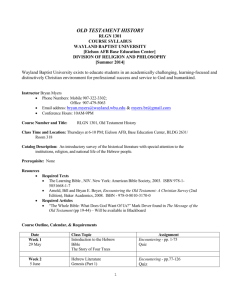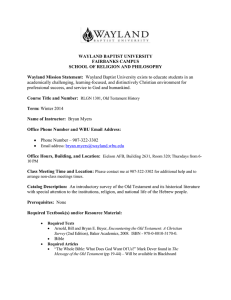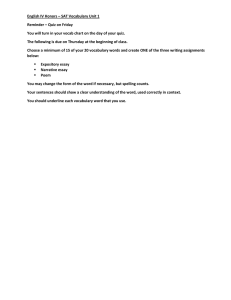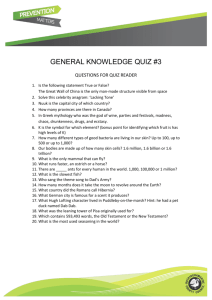WAYLAND BAPTIST UNIVERSITY FAIRBANKS CAMPUS SCHOOL OF RELIGION AND PHILOSOPHY
advertisement
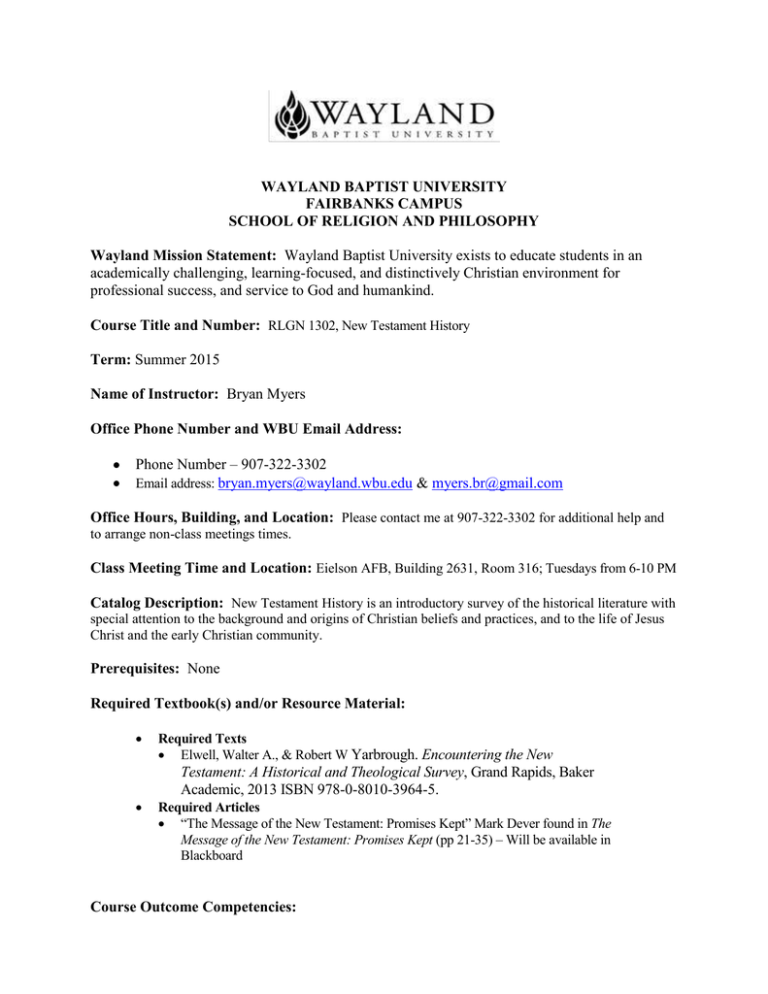
WAYLAND BAPTIST UNIVERSITY FAIRBANKS CAMPUS SCHOOL OF RELIGION AND PHILOSOPHY Wayland Mission Statement: Wayland Baptist University exists to educate students in an academically challenging, learning-focused, and distinctively Christian environment for professional success, and service to God and humankind. Course Title and Number: RLGN 1302, New Testament History Term: Summer 2015 Name of Instructor: Bryan Myers Office Phone Number and WBU Email Address: Phone Number – 907-322-3302 Email address: bryan.myers@wayland.wbu.edu & myers.br@gmail.com Office Hours, Building, and Location: Please contact me at 907-322-3302 for additional help and to arrange non-class meetings times. Class Meeting Time and Location: Eielson AFB, Building 2631, Room 316; Tuesdays from 6-10 PM Catalog Description: New Testament History is an introductory survey of the historical literature with special attention to the background and origins of Christian beliefs and practices, and to the life of Jesus Christ and the early Christian community. Prerequisites: None Required Textbook(s) and/or Resource Material: Required Texts Elwell, Walter A., & Robert W Yarbrough. Encountering the New Testament: A Historical and Theological Survey, Grand Rapids, Baker Academic, 2013 ISBN 978-0-8010-3964-5. Required Articles “The Message of the New Testament: Promises Kept” Mark Dever found in The Message of the New Testament: Promises Kept (pp 21-35) – Will be available in Blackboard Course Outcome Competencies: Demonstrate knowledge of the historical, religious, and social context of the New Testament world. Demonstrate knowledge of some of the critical methods used in New Testament studies. Demonstrate an understanding of the basic content of the New Testament and its main teachings (theological content). Demonstrate knowledge of the canonical process producing a more complete understanding of the New Testament. Attendance Requirements: Roll will be checked each class meeting. If you are late for class, it is your responsibility to have your absence removed form the grade book. The Division's "no cut" policy allows no unexcused absences. No student missing more than 25% of the class meetings (including both excused and unexcused absences) can pass the course. Students who need to leave class early must get approval from the professor in advance. Attendance - External Campuses Students enrolled at one of the university's external campuses should make every effort to attend all class meetings. All absences must be explained to the instructor, who will then determine whether the omitted work may be made up. When a student reaches that number of absences considered by the instructor to be excessive, the instructor will so advise the student and file an unsatisfactory progress report with the campus dean. Any student who misses 25 percent or more (3 Classes) of the regularly scheduled class meetings may receive a grade of F in the course. Additional attendance policies for each course, as defined by the instructor in the course syllabus, are considered a part of the university's attendance policy. A student may petition the Academic Council for exceptions to the above stated policies by filing a written request for an appeal to the provost/academic vice president. Disability Statement: In compliance with the Americans with Disabilities Act of 1990 (ADA), it is the policy of Wayland Baptist University that no otherwise qualified person with a disability be excluded from participation in, be denied the benefits of, or be subject to discrimination under any educational program or activity in the university. The Coordinator of Counseling Services serves as the coordinator of students with a disability and should be contacted concerning accommodation requests at (806) 291- 3765. Documentation of a disability must accompany any request for accommodations.” Course Requirements and Grading Criteria: University Grading System A 90-100 B 80-89 C 70-79 D 60-69 F BELOW 60 I Cr NCr WP WF W INCOMPLETE** FOR CREDIT NO CREDIT WITHDRAWAL PASSING WITHDRAWAL FAILING WITHDRAWAL **A grade of incomplete is changed if the deficiency is made up by midterm of the next regular semester; otherwise, it becomes "F". This grade is given only if circumstances beyond the student's control prevented completion of work during the semester enrolled and attendance requirements have been met. A grade of "CR" indicates that credit in semester hours was granted but no grade or grade points were recorded. Elements of Final Grade o Essays – 250 points (50 points per essay) o Mid-Term Exam– 250 points o Final Exam – 250 points o Quiz Average – 200 points (23 points per quiz) o Participation – 50 points o Extra Credit – If over 75% of the class submits the end of term class review, I will give the entire class 20 extra points. While I encourage you to let someone else proof read each of your papers, if you turn in the correction that your proofreader made for one paper I will give you 20 bonus points. Quiz, Exam, & Essay Information 1. QUIZZES: Quizzes will be given weekly over the reading assignment. The quizzes will cover the material read in A Survey of the New Testament and reading from the Bible. Regardless of where we are in the class lecture, the quizzes will be taken from the reading material for the week. Follow the syllabus and you will do fine. I’ll post the quiz on Blackboard on Monday and remove it Saturday at midnight. The quizzes will be open book, but once you take it, there are no retakes. Makeup quizzes will be sparingly administered with prior consent of the instructor. If a student either fails to submit a quiz or obtain prior consent, the student will be given a score of zero for that quiz. 2. MID-TERM and FINAL EXAMS: The mid-term and final exams will cover lecture material. If you miss the exam and have my prior consent you will be given a different make-up exam. Make up exams will generally be taken within a week of the scheduled exam. Please contact me to make arrangement for make-up exams. The final exam will not be comprehensive. 3. ESSAYS (Five Total): Students will be responsible for an on time submission of a 600-800 word (about two pages) essay on the given topic or question(s). Each essay will be worth 50 points. Regarding the content of these essays, please understand the writing assignment before you start writing. If you do not understand, ask. I want to help you. The content of the paper should be based upon your thoughts and interactions, so quotations should be minimal. Finally, please do not try to take a position that you feel I will find agreeable, in hopes of a better grade or thinking “this is what he [Bryan] wants me to say.” You should give an honest response that indicates that you are familiar and interacting with the material. If something in the reading uplifts, encourages, challenges, or upsets you, I want you to tell me in your paper. As far as the grading criteria, I am looking for fulfillment of the essay objectives. You will be graded based upon their success in answering the question and carrying on a logical and coherent argument. Also, grammar and spelling matter! You will be graded according to a grading rubric that will be presented and explained on the first night of class. Some other grading criteria include prompt turn-in time. (Essays should be turned in on the day marked in the syllabus by the beginning of class. The instructor on a limited basis will approve late submissions). Essays will lose one points for every day they are late for a max loss of eight points. Essays not submitted within two weeks of assigned due date will receive a score of zero. All essays will be submitted via safe assignment on Blackboard. Essays will not be received any other way. Finally, format should be a 12-point font and double-spaced reaching a minimum of 600 words. If you are struggling to meet the required number of words, focus on more content rather than filler words and sentences. All of this is designed to help you to know how your papers will be graded. My effort is to be fair to you on the front end. If you focus on solid content presented in a logical format with few, if any, grammar or spelling errors you will do well. Finally, I want you to do well because I am interested in your thoughts on the assigned topics. Students shall have protection through orderly procedures against prejudices or capricious academic evaluation. A student who believes that he or she has not been held to realistic academic standards, just evaluation procedures, or appropriate grading, may appeal the final grade given in the course by using the student grade appeal process described in the Academic Catalog. Appeals may not be made for advanced placement examinations or course bypass examinations. Appeals are limited to the final course grade, which may be upheld, raised, or lowered at any stage of the appeal process. Any recommendation to lower a course grade must be submitted through the Executive Vice President/Provost to the Faculty Assembly Grade Appeals Committee for review and approval. The Faculty Assembly Grade Appeals Committee may instruct that the course grade be upheld, raised, or lowered to a more proper evaluation. Tentative Schedule: Course Outline, Calendar, & Requirements Date Week 1 26 May Week 2 2 June Week 3 8 June Class Topic Course Overview Introduction to the New Testament The Inter-Testamental Period & New Testament Historical Setting Gospels & The Life of Jesus (Part 1) Week 4 16 June Gospels & The Life of Jesus (Part 2) Review for Mid-Term Week 5 23 June Week 6 30 June Acts (Part 1) Mid-Term Acts (Part 2) Week 7 Early & Major Letters Assignment Encountering pp. 1-62 Quiz 1 – due 30 May @ midnight Encountering pp. 63-104 Quiz 2– due 6 June @ midnight Encountering pp. 105-166 John Quiz 3 – due 13 June @ midnight Essay Due at the beginning of class Encountering pp. 167-206 Luke Quiz 4 – due 20 June @ midnight Essay due at the beginning of class Mid-Term Encountering pp. 207-234 Encountering pp. 235-266 Quiz 5– due 4 July @ midnight Essay due at the beginning of class Encountering pp. 267-308 7 July Week 8 14 July Week 9 21 July Week 10 28 July Week 11 4 August (Galatians, 1&2 Thes, 1 & 2 Cor, Romans) Prison & Pastoral Letters (Ephesians, Philippians, Colossians, I & II Timothy, & Titus) The General Letters (Hebrews, James, I Peter; I-III John, Jude) Revelation Review for Final Final Quiz 6 – due 11 July @ midnight Encountering pp. 309-342 Quiz 7 – due 18 July @ midnight Essay Due at the beginning of class Encountering pp. 343-356 Quiz 8 – due 25 July @ midnight Encountering pp. 356-376 Quiz 9 – due 1 August @ midnight Essay due at the beginning of class Final Exam Academic Honesty (Plagiarism): University students are expected to conduct themselves according to the highest standards of academic honesty. Academic misconduct for which a student is subject to penalty includes all forms of cheating, such as illicit possession of examinations or examination materials, forgery, or plagiarism. Plagiarism is the presentation of the work of another as one’s own work. It is the student’s responsibility to be familiar with penalties associates with plagiarism stated in the catalog. Academic dishonesty in any of its forms will not be tolerated. I know that this is a required class and that your familiarity with the New Testament may be minimal. The printed prerequisite for the class is listed as “none.” I assume little or no knowledge of the New Testament. If you are not a “biblical scholar,” you can do well in the class. At the same time, I expect that even those who are quite familiar with the New Testament will be challenged. The bottom line is that I want you to do well. I want you to love the New Testament, as I do (or more). This may be your first interaction with the New Testament; I want it to be a good one! Finally, I reserve the right to change the syllabus at any time when doing so will contribute towards the fulfillment of the learning objectives.
